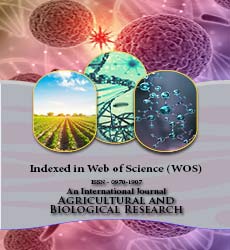Agricultural and Biological Research
RNI # 24/103/2012-R1
B.D Sharma, Bankey Lal*, Rakesh Bhargava and Ravi Kumar
In the Central Institute of Arid Horticulture, Bikaner, Rajasthan, a study on "Establishing integrated nutrient management techniques for horticulture Kinnow crop in arid zone" was conducted in 2018-2019. The study employed a combination of inorganic fertilizers treated with varying combinations, as well as organic manures and biofertilizers. The use of organic manures and biofertilizers with inorganic fertilizers had a substantial impact on the plant's vegetative development, reproductive, and cost-benefit metrics.T11-RDF of NPK+FYM+PSB+AZB+AMF, (1000:500:750 g+50 kg+250 g+250 g+500 g), reveals the maximum plant height (5.50 m), tree spread (N-S) direction (3.55 m) and in (E-W) direction (3.10), stem diameter (95 cm), yield, and fruit quality parameters like the maximum fruit weight (225 g), fruit yield (22.80 t/ha), T.S.S (13.50 Brix), acidity percentage (0.65%), juice percentage (52.00%), and more. For a 17-year-old Kinnow fruit crop, the benefit-cost ratio of several INM treatments was assessed. Results under the same Treatment (T11) showed a value of 3.96. Lack of nutrient delivery may be the reason for the lowest value for vegetative growth, reproductive, and cost-benefit characteristics under management.
